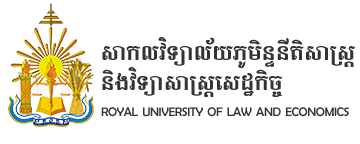Irene Calboli specializes in Intellectual Property, International Trade, and Cultural Heritage Law. She is Regents Professor of Law at Texas A&M University School of Law and holds several honorary and visiting academic appointments, including at SciencesPo Paris, the University of Geneva, the University of Bologna, IE University, Bocconi University, Melbourne University, Stanford University, Singapore University of Social Sciences, and National Law University Delhi. She has been a Visiting Professor and Distinguished Fellow at RULE since 2017. In 2018, she was a Fulbright Specialist in Cambodia, and, in 2022, a Fulbright-Hanken Distinguished Chair in Business and Economics in Finland. A world-renowned expert in her fields, Irene regularly lectures and conducts training programs for international and regional organizations, national IP offices, and universities in every continent. She is an Expert for several United Nations agencies, including the World Intellectual Property Organization, the World Trade Organization, and the International Trade Center. In the past several years, she has advised national governments and regional organizations on topics related to economic development, sustainability, and innovation policy. She has published 11 books and more than 100 articles, book chapters, and policy reports, which are highly regarded and cited by policymakers, judges, and practitioners and have helped shape legislative reforms at the international, regional, and national levels. Her vision and ideas were instrumental in creating, in collaboration with the World Intellectual Property Organization and the World Trade Organization, the “IP and Innovation Research of Asia Network” and the “IP Researchers Europe Conference,” two networks dedicated to facilitating interactions between academics and policymakers She also contributed to the creation of large research networks in Latin America and Africa. She is an elected member of the American Law Institute and the European Law Institute, and serves in leadership roles in several professional organizations, including the International Law Association, the European Policy for Intellectual Property Law Association, the International Trademark Association, and the Association of American Law Schools. She is a graduate of the University of Bologna, Queen Mary University, and the London School of Economics. She is fluent in English, French, Spanish, and Italian, and has a working knowledge of German.
Pr. Irene Calboli has published dozens of articles and eight major books on intellectual property law, and has been a contributor to multiple academic publications. For a list of selected works, please click here.
Course: International Intellectual Property and Commercial Law
Course Modalities:
–Hourly Volume: 15 hours;
–Scheduled: April;
–Programs: International Executive Master in International Business Law (ULB), Year 2.
Course Overview:
This course examines the international intellectual property (IP) system and addresses the legal issues raised by the trade of products protected by IP rights (patents, trademarks, and copyrights). This course reviews the key international agreements and provisions in this area, as well as offers some comparative analysis of the national laws, which have been adopted in several domestic jurisdictions.
By the conclusion of the course, students are expected to: 1) master the basic concepts, issues and rules of IP law and its relationship with international trade; 2) understand the underlying public policies and economic concepts; 3) identify legal issues, apply relevant legal principles, and generate solutions to legal problems arising in relevant factual contexts.
Course Structure:
Module 1: —Introduction
- Presentation of the Course
- Presentation of the students
- Overview (Review) of IP Rights
- The Economic Value of IPRs
- General Principles of International IP Law
- International IP Institutions
Readings:
- WIPO, Understanding Industrial Property (briefly review)
- WIPO, Understanding Copyright Law (briefly review)
- WIPO, Brands: Reputation and Image in the Global Marketplace (briefly review)
- WIPO, Summary of Conventions, Treaties, and Agreements.
- WIPO, Development Agenda, 2009
- WIPO, WIPO and Sustainable Development Goals, 2019
- Annette Kur, International Norm-Making in the Field of Intellectual Property: A Shift Towards Maximum Rules?, 1 WIPO Journal 27 (2009)
Module 2: — Trade Marks and Geographical Indications
- The International Framework of Trade Mark Protection
- Formalities, Requirements for Registration, and Use
- Exclusive Rights
- Exceptions and Limitations
- The International Framework for GIs Protection
- General Protection and Enhanced Protection for Wines and Spirits
- Disputes on GIs Protection
- The Future of GI protection: Multilateral or FTAs?
Readings:
- WIPO, IP Handbook, Chapter 5
- Irene Calboli & Christine Haight Farley, The Trademark Provisions in the TRIPS Agreement, in Intellectual Property and International Trade: TRIPS Agreement, Kluwer Law International, 2016, 157 (Carlos M. Correa & Yusuf A. Abdulqawi eds., 3rd ed.)
- Daniel Gervais, The TRIPS Agreement: Drafting History and Analysis 102-144 (4th ed. 2012)
- WIPO, The Madrid System (briefly review)
- WIPO, The Lisbon Agreement (briefly review)
- WIPO, The Geneva Act (briefly review)
- Download and read two or three chapters of the following book Irene Calboli & Ng-Loy Wee Loon (eds), Geographical indications at the crossroads of trade, development, and culture (2017) https://www.cambridge.org/core/books/geographical-indications-at-the-crossroads-of-trade-development-and-culture/3E2DD2994578FC243041D3EEFFEC39B3#fndtn-contents
Module 3: —Patents, Plant Varieties, and Traditional Knowledge
- The International Framework of Patent Protection
- Requirements for Patent Protection
- Patent Term
- Exclusive Rights
- Exceptions and Limitations: Compulsory License
- The Patent Cooperation Treaty (International Filing)
- International Framework of Plant Variety Protection
- International Framework of Traditional Knowledge Protection
Readings:
- WIPO, IP Handbook, Chapter 5
- WIPO, Protecting Patents (briefly review)
- WIPO, Key Elements on Genetic Resources and TK (2017)
- Daniel Gervais, The TRIPs Agreement, pp. 144-172 (1998).
- Fritz Machlup, An Economic Review of the Patent System (Subcomm. on Patents, Trademarks, and Copyrights of the S. Comm. on the Judiciary, Study No. 15, 85th Cong., 2d Sess. (Comm. Print 1958) (this is a classic reading, you do not need to read it all, but it is useful to understand the origins of the patent system)
- Randy L. Campbell, Global Patent Law Harmonization: Benefits and Implementation, 13 Ind. Int’l & Comp. L. Rev. 605 (2003).
Module 4: —Copyrights and Traditional Cultural Expressions
- International Framework of Copyright Protection
- Copyrightable Subject Matter: Authors’ Works and Entrepreneurial Works
- Copyright Duration
- Exclusive Rights
- The Debate on Moral Rights
- Exceptions and Limitations
- International Framework of Traditional Cultural Expression
Readings:
- WIPO, IP Handbook, Chapter 5
- WIPO, Main Provision and Benefit of the Beijing Treaty (briefly review)
- WIPO, Main Provision and Benefit of the Marrakesh Treaty (briefly review)
- WIPO, Protecting Culture (briefly review)
- WIPO, Protecting Folklore (briefly review)
- Daniel Gervais, The TRIPs Agreement: Drafting History and Analysis, pp. 71-102 (1998).
- Jane C. Ginsburg, A Tale of Two Copyrights: Literary Property in Revolutionary France and America, 64 Tul. L. Rev. 991 (1990).
Module 5: —Enforcement of IPRs and Conclusion!
- The rise of Free Trade Agreements
- Bilateral, Multilateral and Mega Regional Agreements
- Focus on Asia Pacific
- Multilateral International Enforcement
- Enforcement Obligations Under TRIPS
- TRIPs flexibilities and goods in transit
- Plurilateral Enforcement Agreements
- Unilateral Enforcement: the EU and United States experiences
- CONCLUSION!
Readings:
- Jerome H. Reichman, Enforcing the Enforcement Procedures of the TRIPS Agreement, 37 Va. J. Int’L L. 335-356 (1996)
- ICTSD Series, Free Trade of Pharmaceutical Products (by Xavier Seuba)
- ICTSD Series, The Global Debate on the Enforcement of Intellectual Property Rights and Developing Countries (by Carsten Fink & Carlos Correa)
- Daniel Chow, Counterfeiting as an Externality Imposed by Multinational Companies on Developing Countries, 51 Va. J. Int’l L. 785 (2010-11)
- OECD/EUIPO (2019), Trends in Trade in Counterfeit and Pirated Goods, Illicit Trade, https://doi.org/10.1787/g2g9f533-en
Assessment: The final grade for the course will be based on a final take-home paper and class participation.
Final Paper: 80% of the final grade
Students will complete a final paper. The total word count for the final paper should be no more than 3,000 words. The paper should focus on any topic of interest that relates to the core topics of the course. The deadline will be provided during the first session of the course. The paper should be sent to the Director of the Program at [email protected]
Class Participation: 20% of the final grade
Students are expected to attend and actively participate in the course. They are expected to read the class materials and be prepared for the class discussion.

 ភាសាខ្មែរ
ភាសាខ្មែរ







